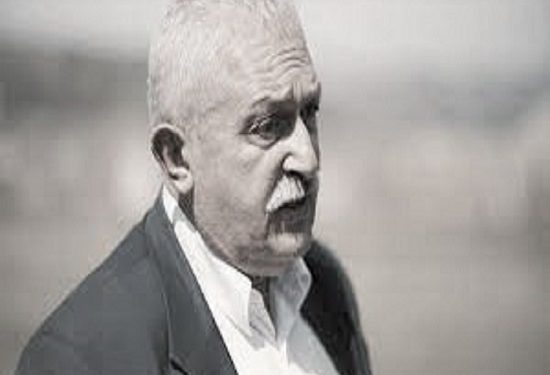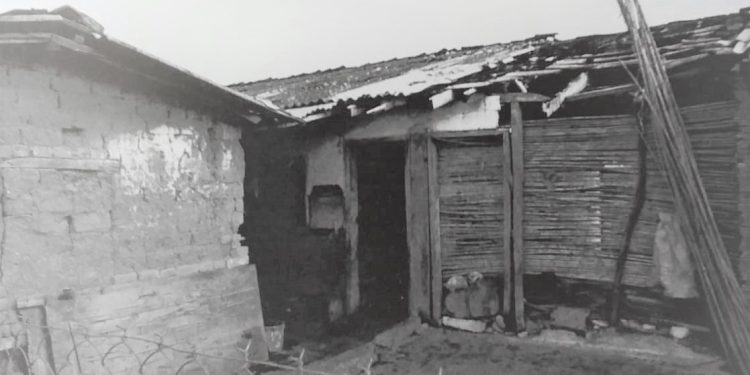By Marcel Hila
Memorie.al/ Crimes of communism in the dictatorial regime of Enver Hoxha and his successor, Ramiz Alia. Testimony of Spiro Rexho, a former political prisoner and prisoner in Vlora and Rubik prisons, who is originally from the Greek minority and was born in 1943 in Nivica, Saranda. He was arrested when he was a soldier in Vlora and sentenced to 1 and a half years with false accusations, that: “when he was performing compulsory military service, he planned to escape and that he had spoken badly about the Party and Enver Hoxha”.
He was transferred to Rubik, where he worked as a prisoner in a copper mine. He was re-sentenced to 17 years. He served 12 years in prison, from 1962 to July 1973. His father, a priest who first served in Nivica and after the war in Mursi, served a prison sentence and died in prison. Originally from the villages of the Greek minority, he was educated in the gymnasium “Zosimea” of Ioannina and then continued in the “Normal” School of Elbasan. As a zealous believer he dressed as a priest and left good impressions wherever he served.
He took part in the fight against the fascist invaders and after the war he was imprisoned for his democratic ideas. The first time he was sentenced to be shot, but the decision was reduced from 25 years to 3 years, due to the protests of the villages where he performed religious services. In the heat of the war against religion, he was imprisoned again, and because of ill-treatment and malnutrition, he died in prison. His remains were found in the Sharra cemetery and his body inside the coffin was raped: with broken limbs.
Spiro Rexho testifies: “My father was sentenced as a priest…! I ate it, because the others signed. They put me in for 1 year and I ended up with 12 years in prison”!
The father and son from the Greek minority, convicted on false charges!
Mr. Spiro, both you and your father have been convicted and suffered in prison. Can you tell us how and why your father was arrested, what charges were brought against him, where he served his sentence, how he died?
My father was of minority origin and left an orphan. His father had died, but also my father’s brother, my uncle. He himself was forced to raise both his orphaned brothers and his brother’s children.
As a young man, honest and patriotic, the village helped him and gave him the opportunity to study at the “Zosimea” gymnasium, Ioannina, where his father finished high school for teachers. He further completed the “Normal” School of Elbasan, with the approval of Josif Pashko’s grandfather, Visarion Pashko, or as he was otherwise known, Paisi Vodica). Some 10-12 minorities went, among them the father, who became a priest for the homeland. He was assigned to Nivica; it was a village where they knew no Greek words; Albanian was his soul and they loved him.
He also took part in the War and this is documented. The father was distinguished for his patriotic qualities, not that he was my father, but he was one of the first intellectuals together with Lefter Talon, who rose up against the Germans, therefore he is registered in the families of the martyrs of the National Liberation War, because he really fought.
After the war, in 1946, he was arrested and taken to Gjirokastra prison. It was for shooting, but the villagers of Nivica got up, 19 men and women, went to Gjirokastra in front of the court and said: “He is the good boy of the minority, do not punish him, and punish us”! They are alive. Then, the sentence from 25 years was changed to 3 years.
When his father was released from prison, he was assigned to villages of Albanian descent, such as in Mursi – a village that did not know Greek at all – for another 20 years, such as in Nivica. He left a great reputation there as well.
So your father suffered in prison until 1949. What happened next?
When Mass was held in the church, he did not give me bread first, but to those who were fatherless and motherless, or to one who had a father in prison. In death, it is not discussed to ever receive lek, no 10-lek. He believed in Christ, he was so faithful that there was no one else. When I went to the army, I was not old, because I was born in 1943, but my birthday was written in 1942.
So you were called up for military service in 1960?
Yes, so I went as a soldier to Vlora at the age of 17, to the Coast Guard Artillery Brigade, where there were 70 other people. A friend says to me: “We are leaving for Greece”? “How to escape, are you on your own”? – I say. “We will leave,” he said. When… they come and arrest me. I laughed because I had done nothing.
They had made a document as if I had talked about escaping and that I had spoken against Enver. Tajar Bushi is coming, he is still alive today, he says in court: “This is the only man who has not spoken against the homeland of the Party”. – “Did you come to release him?” they said. “No,” he said, “I came to tell the truth.”
Was it true that you wanted to escape?
No, brother, they know it well. I was a soldier in Vlora. The one, who proposed me to run away, admitted he was guilty and apologized to me. Yes, he apologized to me. He is the same age as me. He was sentenced to prison. I was also called as a witness, but I at the investigator did not admit that I had talked to him.
In what country did you serve your prison sentence?
I was arrested in Vlora, when I was a soldier and I spent 1 year and a half in prison, then in Rubik straight to the mine, for extracting copper. There I was sentenced to 17 years, we were a group. I was arrested on November 19, 1962, and I was imprisoned until July 1973, when I was 12 years old.
From a false accusation of escape plans, say, that you were not actually caught in any attempt, you were re-convicted a second time and this time 17 times more than the first time! You entered innocent with 1 year sentence and became a dangerous culprit!
You know? When I was 7 months inside, the decision came from Tirana, from the investigator, who is innocent and must leave. But another one was convicted with me and he was bought and he insisted, saying: “You will go out today, but you have nowhere to sleep. So you better stay here, because today is Friday, tomorrow is Saturday, Sunday. “On Monday, the prosecutor and the investigator will come and take you out, because you are innocent.”
I out of joy did not even want to eat bread. I got the family on the phone and told them I would be released. Monday, at 10.00, was a black day for me. Petrit Akani, prosecutor, honest man, and honest man came, put his hand here and said to me: “Spiro, listen, you are really an innocent man, but those from the Prosecution, refuse to sign your release, innocence”!
I told him: “This one from Saranda did it to me, this one did not carry out the orders, and this one did the great misfortune”. And so they did not issue me the document, but with 2 false witnesses, they took me to Rubik, 1 year and two months. The general also came. “Spiro,” he told me, “you will go to prison, but know that you are innocent.” You are not alone, there are 82 people “.
What do you want? I ate that they signed…! That was my story! I went to jail and ended up with 12 years without 3 months. When I was in prison, they took my father again, because it was another problem, since he was a priest; there were about 10-12 priests… and that of the priests përgat was being prepared! As for the documents? They adjusted themselves as they wished. The father died in prison.
Can you tell us about his death? Have you asked for his bones?
At that time I was working in Laç, in the Superphosphate Plant, I was a good electrician technician. At that time I was with Bardhyl Belishova. My father dies in Tirana prison. From the information I had, a prison captain was bringing food from home…! I tried to find out who sent him the bread. It was a bishop from Bishop who gave him the food.
In which prison was the father?
At the old prison in Tirana. We learned that he was buried in Kombinat. The person in charge of the Kombinat cemetery in Sharra had known one of our uncles who lived in Tirana and when my brother inquired about the place where he was buried, he helped us and we found him.
But something happened. When we went to get it out, we were all amazed: the body was not normally positioned as a man dies, but it was a part of the body and the legs were thrown to the side tij! I do not know. We all saw this: parts of the leg were like that…!
You are rightly surprised, Mr. Spiro. We also have information from other witnesses that he was a political prisoner because in prisons they had a practice of raping corpses: they cut off their legs with pickaxes and placed them on or next to their bodies. Then they put them in bags or small coffins. At least, you managed to find your father’s grave, that most do not even know where they may have been buried.
Yes. We found it. We also received some rewards for the time of the war and with them we fixed his grave. It became all marble as a monument.
How did you expect democracy?
We could hardly wait for democracy.
Thank you, Mr. Spiro!
Thank you Mr. Marcel, you are interested in our layer of convicts and political persecuted, so that people know the horrors of the dictatorial communist regime of Enver Hoxha. Memorie.al












